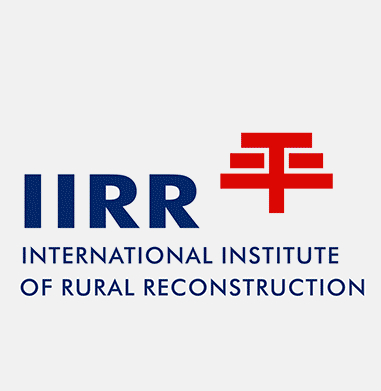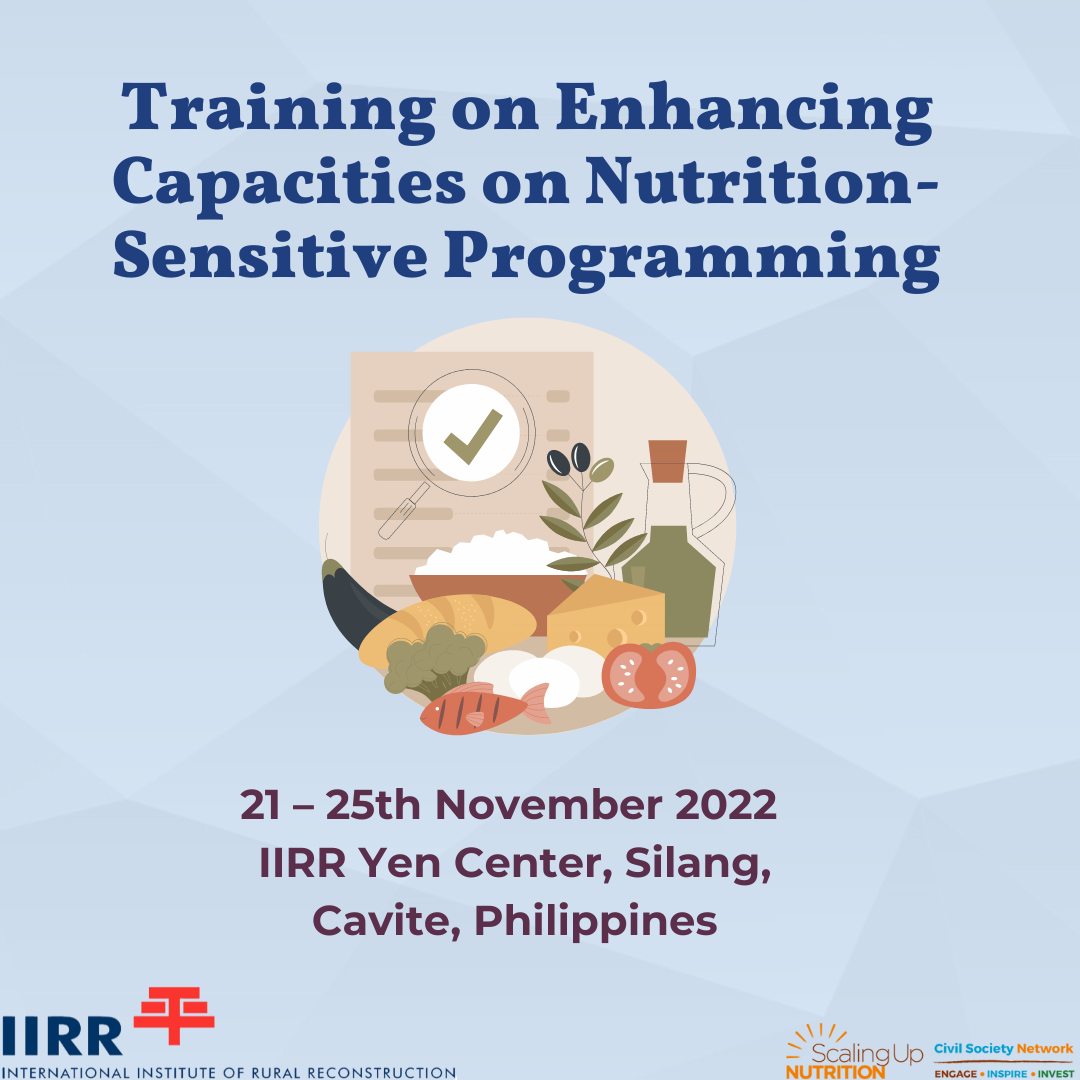November 15-16th 2022 (virtual) 21 – 25th November 2022 (in-person) IIRR Yen Center, Silang, Cavite, Philippines Application deadline: 27th September Malnutrition and hunger continue to afflict children and adults alike across the world, affecting their growth, development, and productivity. If unaddressed, undernutrition has serious short and long-term consequences for a child’s development. Access to, and […]
LeerTodas las noticias sobre Programme
Seleccione los temas que le interesan para filtrar los artículos de prensa.
Enviar artículos de prensa
Si es usted parte de la Red de la Sociedad Civil SUN y desea compartir un artículo de prensa, envíelo completando el formulario de contacto y seleccione la opción «Enviar un artículo de prensa» en «Motivo por el que nos contacta» para que podamos revisarlo y publicarlo.
November 15-16th 2022 (virtual)
21 – 25th November 2022 (in-person)
IIRR Yen Center, Silang, Cavite, Philippines
Application deadline: 27th September
Malnutrition and hunger continue to afflict children and adults alike across the world, affecting their growth, development, and productivity. If unaddressed, undernutrition has serious short and long-term consequences for a child’s development. Access to, and availability of, nutritionally dense food is also threatened by ongoing environmental and climate changes.
As such, we are offering to support ten CSN members to participate in the hybrid training on nutrition-sensitive programming hosted by the International Institute of Rural Reconstruction (IIRR). Participants will have the opportunity to visit actual projects being implemented by IIRR in partnership with the Philippines Department of Education and the Food and Nutrition Research Institute of the Department of Science and Technology and to apply the knowledge they have learned to develop action plans outlining how they will strengthen people’s resilience in coping with threats to food security.
Learning objectives
By the end of this course, participants will have:
- A thorough understanding of the State of the Food Security and Nutrition in the World recognizing the key issues or challenges and their impact on families and communities given the changing environment.
- Understanding of the concepts of nutrition-sensitive approach (NSA) and nutrition-sensitive programming (NSP), its importance, conceptual framework for action, principles and key strategies.
- Identified strategic and effective ways in developing and managing nutrition-sensitive programmes and interventions.
- Understanding of the participatory approaches in engaging communities to participate in community-based nutrition-sensitive programmes and projects.
- Formulated an action plan reflecting application of lessons learned and insights gained from the course in line with their national or community’s food security and nutrition context.
Course Information
You will be expected to complete the two sessions on the 15th and 16th November virtually from your home country. All participants will need to arrive in the Philippines one day before the training (Sunday 20th) and to leave one day following the training (Saturday 26th).
Module 1: Understanding the State Food Security and Nutrition in the World
Participants will have an overview of the State of the World on Food Security and Nutrition. Focus will be in examining key issues or challenges causing food insecurity, under nutrition and the environment along with various interventions, programmes or projects initiated at global, national or at local levels in meeting food security and the nutritional needs of families and communities.
Session 1: State of the Food Security and Nutrition in the World (SOFI)
Session 2: Participants’ Sharing on Countries’ Interventions, Programmes and Projects Concepts
Module 2: Concepts and Framework of Nutrition-sensitive Approach (NSA) and Nutrition-sensitive Programming (NSP)
Nutrition and Food Security experts and practitioners will be invited to lead an interactive discussion to have a common understanding of basic concepts on NSA/NSP and have an overview of the importance, conceptual framework for action, principles, and key strategies in nutrition-sensitive programming.
Session 1: The Nutrition-Sensitive Approach and Nutrition-Sensitive Programming
Session 2: Conceptual Framework for Action and Principles of Nutrition-Sensitive Programming
Session 3: Key Strategies in Nutrition-Sensitive Programming
Module 3: Developing and Managing Nutrition-Sensitive Programming
Through roving workshops, the participants will identify ways in developing and managing nutrition-sensitive programmes and projects. They will have an opportunity to learn from other participants on the participatory approaches they were engaged with in designing and enhancing food security and nutrition innovations and programmes or projects in consideration of climate change challenges. They will visit relevant nutrition sensitive program/project/ initiatives implemented by government institutions civil society organizations and learn from their experiences.
Session 1: Developing and Managing Nutrition-Sensitive Programmes/Projects
Session 2: Visits to relevant Nutrition sensitive programme / project/ initiatives
Module 4: Action Planning
The participants will prepare an action plan identifying programmes or activities considering their national or community’s food security and nutrition context to strengthen people’s resilience in coping with threats to food security. Should it be necessary, climate change adaptation and mitigation measures can be integrated in the action plan.
Venue
Yen Center, Silang, Cavite, Philippines
Course Fee
USD $2,000 per participant (inclusive of board, lodging, airport transfers, and training materials). The SUN CSN has funding to cover ten participants’ training and flight costs.
The course is open to all CSN members who can cover the course fee and airfare.
Participant Requirements
- Member of a Civil Society Alliance (CSA)
- Good working knowledge of English
- Committed to sharing learnings from the training to other CSA members
- Able to participate in all the virtual and in-person sessions
- Passport must have at least 6 months validity from the date of entry to the Philippines
- Fully vaccinated with acceptable proof of vaccination (foreign nationals who are not fully vaccinated cannot enter the Philippines)
Please apply for the training here.



